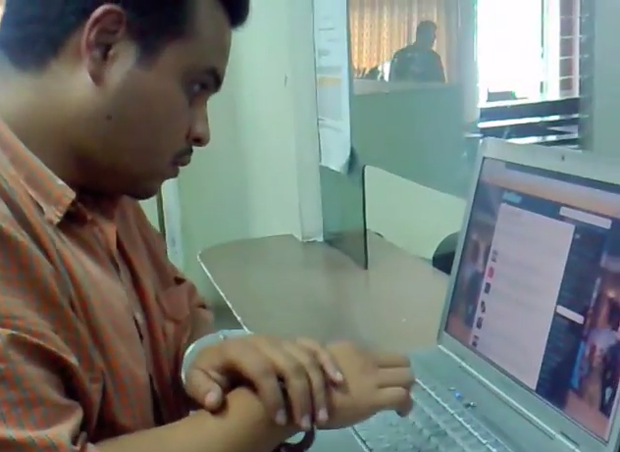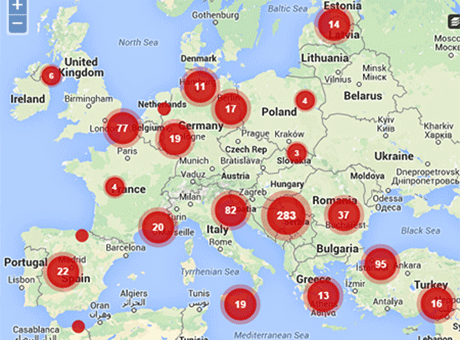17 Jun 2015 | Azerbaijan News, mobile, News and features
Governments don’t really like coming across as authoritarian. They may do very authoritarian things, like lock up journalists and activists and human rights lawyers and pro democracy campaigners, but they’d rather these people didn’t talk about it. They like to present themselves as nice and human rights-respecting; like free speech and rule of law is something their countries have plenty of. That’s why they’re so keen to stress that when they do lock up journalists and activists and human rights lawyers and pro-democracy campaigners, it’s not because they’re journalists and activists and human rights lawyers and pro-democracy campaigners. No, no: they’re criminals you see, who, by some strange coincidence, all just happen to be journalists and activists and human rights lawyers and pro-democracy campaigners. Just look at the definitely-not-free-speech-related charges they face.
1) Azerbaijan: “incitement to suicide”

Khadija Ismayilova is one of the government critics jailed ahead of the European Games.
Azerbaijani investigative journalist Khadija Ismayilova was arrested in December for inciting suicide in a former colleague — who has since told media he was pressured by authorities into making the accusation. She is now awaiting trial for “tax evasion” and “abuse of power” among other things. These new charges have, incidentally, also been slapped on a number of other Azerbaijani human rights activists in recent months.
2) Belarus: participation in “mass disturbance”
Belorussian journalist Irina Khalip was in 2011 given a two-year suspended sentence for participating in “mass disturbance” in the aftermath of disputed presidential elections that saw Alexander Lukashenko win a fourth term in office.
3) China: “inciting subversion of state power”
Chinese dissident Zhu Yufu in 2012 faced charges of “inciting subversion of state power” over his poem “It’s time” which urged people to defend their freedoms.
4) Angola: “malicious prosecution”
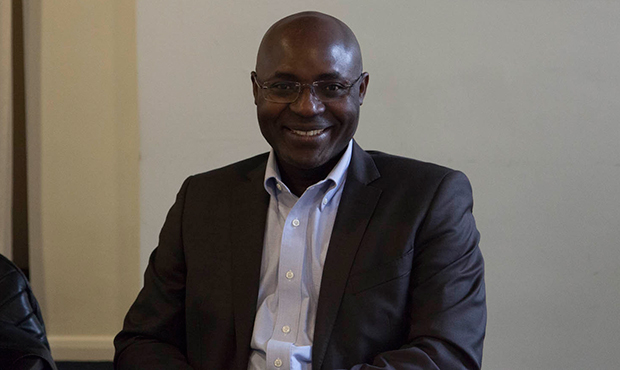
Journalist and human rights activist Rafael Marques de Morais (Photo: Sean Gallagher/Index on Censorship)
Rafael Marques de Morais, an Angolan investigative journalist and campaigner, has for months been locked in a legal battle with a group of generals who he holds the generals morally responsible for human rights abuses he uncovered within the country’s diamond trade. For this they filed a series of libel suits against him. In May, it looked like the parties had come to an agreement whereby the charges would be dismissed, only for the case against Marques to unexpectedly continue — with charges including “malicious prosecution”.
5) Kuwait: “insulting the prince and his powers”
Kuwaiti blogger Lawrence al-Rashidi was in 2012 sentenced to ten years in prison and fined for “insulting the prince and his powers” in poems posted to YouTube. The year before he had been accused of “spreading false news and rumours about the situation in the country” and “calling on tribes to confront the ruling regime, and bring down its transgressions”.
6) Bahrain: “misusing social media

Nabeel Rajab during a protest in London in September (Photo: Milana Knezevic)
In January nine people in Bahrain were arrested for “misusing social media”, a charge punishable by a fine or up to two years in prison. This comes in addition to the imprisonment of Nabeel Rajab, one of country’s leading human rights defenders, in connection to a tweet.
7) Saudi Arabia: “calling upon society to disobey by describing society as masculine” and “using sarcasm while mentioning religious texts and religious scholars”
In late 2014, Saudi women’s rights activist Souad Al-Shammari was arrested during an interrogation over some of her tweets, on charges including “calling upon society to disobey by describing society as masculine” and “using sarcasm while mentioning religious texts and religious scholars”.
8) Guatemala: causing “financial panic”
Jean Anleau was arrested in 2009 for causing “financial panic” by tweeting that Guatemalans should fight corruption by withdrawing their money from banks.
9) Swaziland: “scandalising the judiciary”
Swazi Human rights lawyer Thulani Maseko and journalist and editor Bheki Makhubu in 2014 faced charges of “scandalising the judiciary”. This was based on two articles by Maseko and Makhubu criticising corruption and the lack of impartiality in the country’s judicial system.
10) Uzbekistan: “damaging the country’s image”
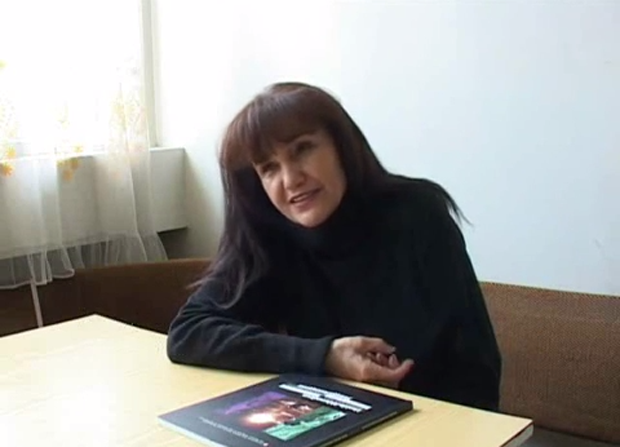
Umida Akhmedova (Image: Uznewsnet/YouTube)
Uzbek photographer Umida Akhmedova, whose work has been published in The New York Times and Wall Street Journal, was in 2009 charged with “damaging the country’s image” over photographs depicting life in rural Uzbekistan.
11) Sudan: “waging war against the state”
Al-Haj Ali Warrag, a leading Sudanese journalist and opposition party member, was in 2010 charged with “waging war against the state”. This came after an opinion piece where he advocated an election boycott.
12) Hong Kong: “nuisance crimes committed in a public place”
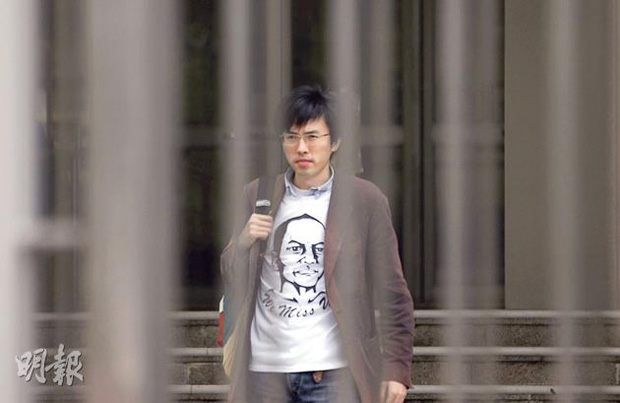
Avery Ng wearing the t-shirt he threw at Hu Jintao. Image from his Facebook page.
Avery Ng, an activist from Hong Kong, was in 2012 charged “with nuisance crimes committed in a public place” after throwing a t-shirt featuring a drawing of the late Chinese dissident Li Wangyang at former Chinese president Hu Jintao during an official visit.
13) Morocco: compromising “the security and integrity of the nation and citizens”
Rachid Nini, a Moroccan newspaper editor, was in 2011 sentenced to a year in prison and a fine for compromising “the security and integrity of the nation and citizens”. A number of his editorials had attempted to expose corruption in the Moroccan government.
This article was originally posted on 17 June 2015 at indexoncensorship.org
2 Jun 2015 | Africa, Angola, mobile, News and features, Statements
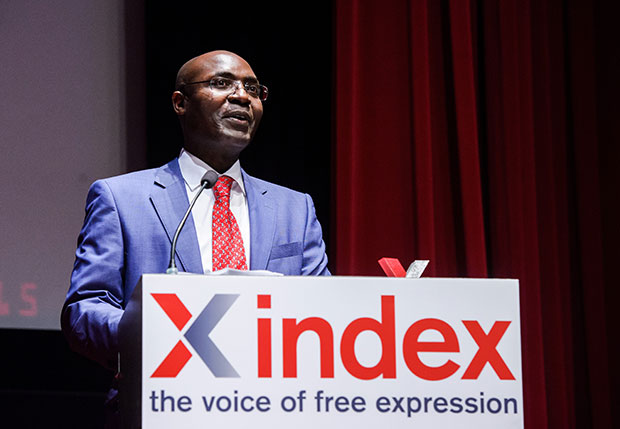
Journalist and human rights activist Rafael Marques de Morais (Photo: Alex Brenner for Index on Censorship)
International signatories from the worlds of technology, journalism, publishing, theatre, film and business, including jewellers Tiffany & Co, called on Angolan president José Eduardo dos Santos on Tuesday to drop the prosecution of award-winning investigative journalist Rafael Marques de Morais.
Marques was last week given a six-month suspended sentence following a trial in which he faced criminal defamation charges over his 2011 book on blood diamonds, which was published for the first time in English on Tuesday.
“Rafael’s trial was a sham. He was told charges would be dropped, only for him to be hit with new charges out of the blue, and he was not allowed to present his evidence or call witnesses,” said Jodie Ginsberg, CEO of freedom of expression group Index on Censorship, which organised the letter.
“Rafael is a courageous journalist, working with little support to expose corruption in Angola. This absurd trial and verdict is meant to stop him from speaking out. We want to make sure that does not happen.”
Marques was awarded an Index on Censorship Freedom of Expression award in March for his work. Signatories to the letter include jewellers Tiffany & Co.; tech entrepreneurs Martha Lane Fox, one of the judges of the awards, and Wikipedia founder Jimmy Wales; authors Philip Pullman, Neil Gaiman and Elif Shafak; actors Janet Suzman, Juliet Stevenson, and Simon Callow; playwrights Howard Brenton and Timberlake Wertenbaker; as well as Steve McQueen, director of Oscar-winning film 12 Years a Slave. Other signatories included journalists Sir Harold Evans and Christina Lamb; and artists and writers with direct experience of censorship, such as Syrian political cartoonist Ali Ferzat and Azerbaijani journalist Idrak Abbasov.
The letter will be delivered by Index on Censorship to the Embassy of Angola in London on Tuesday, June 2.
For more information, contact David Heinemann on 0207 260 2664 or email [email protected].
The letter
We, the undersigned, call on Angolan President José Eduardo dos Santos to drop the prosecution of journalist Rafael Marques de Morais.
Marques’ vital investigations into human rights abuses should not be impeded by the threat of jail, which is set to loom over him for two years under the court’s terms.
His conviction and six-month suspended sentence are a clear violation of the rights to free expression, to a free press and to a fair trial.
Marques’ reporting is fundamental not only to Angola, but to the world at large.
We call on you to ensure standards of international law are applied during the appeal process.
Yours faithfully,
Ali Ferzat, cartoonist
Angela Quintal, editor, Mail & Guardian, South Africa
Dame Ann Leslie, journalist
Anthony Barling, lawyer
Art Kaufman, World Movement for Democracy
Bob Fu, founder and president, ChinaAid
Brilliant Earth Jewellery
Carl Gershman, president, National Endowment for Democracy
Chantal Uwimana, Transparency International
Chie Murakami, director general, Diamonds for Peace, Japan
Christopher Hird, film producer
Christophe Deloire, secretary-general, Reporters Without Borders
Christina Lamb OBE, journalist
David Aaronovitch, columnist
David Harewood MBE, actor
David McCune, publisher
David Schlesinger, founder, Tripod Advisors
Dreda Say Mitchell, author
Edward Fitzgerald CBE QC, lawyer
Elaine Potter, journalist
Elif Shafak, author
Geoffrey Hosking OBE, historian
Grigory Pasko, journalist
Sir Harold Evans, journalist
Howard Brenton, playwright
Idrak Abbasov, journalist
Janet Suzman, actor and director
Jesper Højberg, executive director, International Media Support
Jeffrey Smith, Robert F Kennedy Centre for Justice & Human Rights
Jimmy Wales, founder, Wikipedia
Jodie Ginsberg, chief executive, Index on Censorship
John Witherow, editor, The Times, UK
Juliet Stevenson, actor
Kamila Shamsie, author
Kostas Vaxevanis, journalist
Lara Pawson, author of In the Name of the People: Angola’s Forgotten Massacre
Larry Kilman, secretary-general, World Association of Newspapers and News Publishers
Leber Jeweler Inc
Lee Hirsch, film director
Lindsey Hilsum, journalist
Louise Redvers, journalist
Mariane Pearl, journalist
Mark Stephens CBE, senior member, Howard Kennedy LLP
Martha Lane Fox CBE, House of Lords
Mary Lawlor, executive director, Front Line Defenders
Maya Wolfe-Robinson, journalist
Matthew d’Ancona, journalist
Matthew Parris, journalist
Mohamed Al-Dharadji, film director
Neil Gaiman, author
Paul Webster, film producer
Peter Oborne, journalist
Peter Kellner, president, YouGov
Peter Pomerantsev, author
Peter Tatchell, director, Peter Tatchell Foundation
Philip Pullman, author
Rahim Haciyev, editor, Azadliq, Azerbaijan
Richard Sambrook, director, Centre for Journalism, Cardiff University
Ronald Deibert, academic
Robert McCrum, writer and editor
Sanar Yurdatapan, Initiative for Freedom of Expression, Turkey
Shubhranshu Choudhary, journalist
Simon Callow CBE, actor
Steve McQueen CBE, film director
Sue Woodford-Hollick OBE, businesswoman
Sue Valentine, Committee to Protect Journalists Africa Programme
Suzanne Nossel, executive director, PEN American Centre
Stephen Hull, editor-in-chief, Huffington Post UK
Thomas Hughes, executive director, Article 19
Tiffany & Co.
Timberlake Wertenbaker, playwright
Turi Munthe, founder, Demotix
Yoav Shamir, filmmaker
Ziyad Marar, publisher
1 May 2015 | Denmark, European Union, France, Germany, Greece, Hungary, Ireland, Italy, Macedonia, mobile, News and features, Poland, Spain, Turkey, Ukraine, United Kingdom
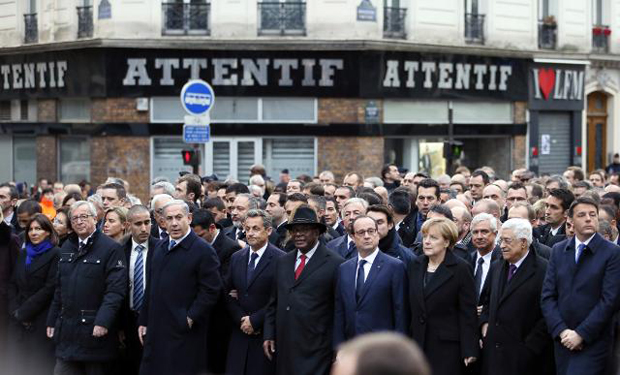
As we approach World Press Freedom Day, the right to freedom of expression will again be celebrated as an inalienable European value across the continent — by the public, the media and politicians alike. But to many, this will mean little more than engaging in a well trodden mental routine. We hardly consider the difficulties that freedom of expression faces in practice.
In the first part of 2015, more than a third of journalist killings in the word took place in two European countries; France and Ukraine. If it is true that Europe’s reactions to the Charlie Hebdo attack — the majority of them very emotional — were salubrious, they simultaneously gave rise to ambiguous situations. Many of the leaders that will on 3 May reaffirm their commitment free expression, supported the same message by taking part in the historic march in Paris on 11 January.
But upon seeing Angela Merkel, some were also reminded that Germany continues to treat blasphemy as a crime — as do Denmark, Spain, Poland and Greece, among others. Ireland, whose Enda Kenny was also in attendance, has a constitution which specifically mentions blasphemy and in 2010 enacted a new law against it. All these European countries defend themselves by saying that they do not apply their laws against “blasphemers”. That argument does not carry much weight when it comes to opposing those countries — Saudi Arabia, Iran, various Asian countries — that have tried to turn blasphemy into a universal crime recognised by the UN.
Spain’s Mariano Rajoy too marched in solidarity, but his government has taken steps to promote changes in the penal code that would “represent a serious threat to freedom of information, expression and the press”.
And what was Viktor Orban doing in Paris? The Hungarian president has reunified Hungary‘s public media so as to better bind them to his own party. Despite being the leader of an EU country, Orban has followed Vladimir Putin’s example. In this experimental model, the Andrei Sakharov Center and Museum is no longer ordered to close as it was in the old days, but rather fined 300,000 roubles (€5,000) for failing to register as a “foreign agent”. One day brings an announcement of compulsory registration for bloggers in Russia; another day, harassment against Russian and Hungarian NGOs perceived as “unpatriotic”.
Turkish Prime Minister Ahmet Davutohlu traveled to Paris, only to later label Charlie Hebdo’s post-attack issue a “provocation”. A reminder: Turkey is an EU candidate country where dozens of journalists have been sentenced to prison, and where various internet sites, including those that dared to reproduce some of Charlie Hebdo’s caricatures, have been blocked.
But also present at the march, were various representatives of European journalists — myself included. Just behind the Charlie Hebdo survivors, we carried a banner with the message “Nous sommes Charlie”.
Walking next to me was Franco Siddi, of the Italian National Press Federation. He talked to me about how imprisonment for defamation is still a possibility in Italy, though the European Court of Human Rights has ruled it a disproportionate punishment.
In my home country Spain too, this possibility of imprisonment remains, even if under Spanish jurisprudence freedom of expression consistently prevails over the demands of plaintiffs. In Italy, the situation is the same, yet my Italian colleagues point out that in 2014 alone, 462 journalists in the country were threatened with legal action for alleged acts of defamation. And while the current proposal for reform being considered foresees eliminating the possibility of jail time, it increases the potential fines.
This is not the only potential legal threat facing European journalists. Long before 9/11, there existed a reflexive habit of passing “urgent” laws under security pretexts, as in the UK during the most difficult years of the Northern Ireland conflict. The current model is the United States’ Patriot Act, which has recently been discussed in France. Meanwhile, in Britain and Spain are debating what free expression activists describe as “gag laws”. In Macedonia, the sentencing of the investigative journalist Tomislav Kezarovski to two years in prison under one of these security inspired laws stands out as a warning sign.
Against this worrying backdrop, across Europe journalists, freedom advocates, campaigners and even politicians are standing up for press freedom. When Gvozden Srecko Flego, member of the Parliamentary Assembly of the Council of Europe, recently highlighted the cases of Russia, Ukraine, Turkey and Azerbaijan as particularly problematic, he also suggested a countermeasure. He recommends “organising annual debates […], with the participation of journalists’ organisations and media outlets” in the respective parliaments of each state.
Media concentration, one of the most serious challenges to media pluralism and free expression in Europe, is being tackled. One proposal, which some international bodies have already accepted, would create a “Media Identity Card” requiring owners to publicly identify themselves and thus create an environment of more open and transparent media ownership.
When defending freedom of expression as a European value, we cannot allow ourselves to simply fall in into mental routines. This World Press Freedom Day we need both words and actions.
Paco Audije is a member of the Steering Committee of the European Federation of Journalists (EFJ)
World Press Freedom Day 2015
• Media freedom in Europe needs action more than words
• Dunja Mijatović: The good fight must continue
• Mass surveillance: Journalists confront the moment of hesitation
• The women challenging Bosnia’s divided media
• World Press Freedom Day: Call to protect freedom of expression
This column was posted on 1 May 2015 at indexoncensorship.org



